
The Christian doctrine of the Trinity is the central doctrine concerning the nature of God in most Christian churches, which defines one God existing in three, coeternal, consubstantial divine persons: God the Father, God the Son and God the Holy Spirit, three distinct persons (hypostases) sharing one essence/substance/nature (homoousion).
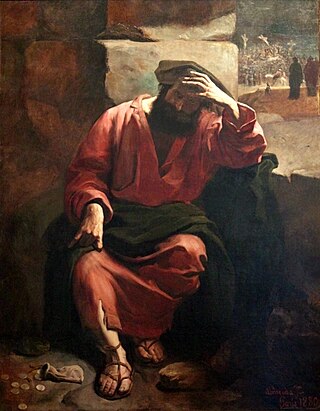
Judas Iscariot was—according to Christianity's four canonical gospels—a first-century Jewish man who became a disciple and one of the original Twelve Apostles of Jesus Christ. Judas betrayed Jesus to the Sanhedrin in the Garden of Gethsemane, in exchange for 30 pieces of silver, by kissing him on the cheek and addressing him as "master" to reveal his identity in the darkness to the crowd who had come to arrest him. In modern times, his name is often used synonymously with betrayal or treason.

Maximus the Confessor, also spelled Maximos, otherwise known as Maximus the Theologian and Maximus of Constantinople, was a Christian monk, theologian, and scholar.

In Christian theology, the Harrowing of Hell is the period of time between the Crucifixion of Jesus and his resurrection. In triumphant descent, Christ brought salvation to the souls held captive there since the beginning of the world.

Jürgen Moltmann was a German Reformed theologian who was a professor of systematic theology at the University of Tübingen and was known for his books such as the Theology of Hope, The Crucified God, God in Creation and other contributions to systematic theology. His works were translated into many languages.
Andrew Purves is a Scottish theologian in the Reformed tradition through the Church of Scotland. He holds the Chair in Reformed Theology at Pittsburgh Theological Seminary.

ErichPrzywara was a Jesuit priest, philosopher, and theologian of German-Polish origin, who was one of the first Catholics to engage in dialogue with modern philosophers, especially those of the phenomenological tradition. He is best known for synthesizing the thought of prominent thinkers around the notion of the analogy of being, the tension between divine immanence and divine transcendence, a "unity-in-tension".
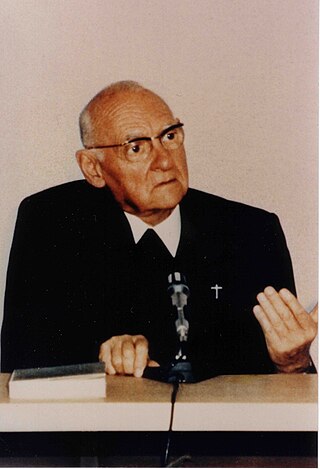
Hans Urs von Balthasar was a Swiss theologian and Catholic priest who is considered one of the most important Catholic theologians of the 20th century. With Joseph Ratzinger and Henri de Lubac, he founded the theological journal Communio. Over the course of his life, he authored 85 books, over 500 articles and essays, and almost 100 translations. He is known for his 15-volume trilogy on beauty, goodness (Theo-Drama), and truth (Theo-Logic).
John Saward is a Roman Catholic priest. He is Senior Research Fellow at Blackfriars in the University of Oxford in England. He previously held the posts of lecturer in dogmatic theology at St Cuthbert's College, Ushaw (1980–1992), Professor of Systematic Theology at St Charles Borromeo Seminary in Philadelphia, Pennsylvania (1992–1998), Professor of Dogmatic Theology in the International Theological Institute, Gaming, Austria, and visiting professor in Systematic Theology and Christology in the same institute.
The biblical account of the crucifixion, death, and resurrection of Jesus (ʿĪsā) recorded in the Christian New Testament is traditionally rejected by the major branches of Islam, but like Christians they believe that Jesus ascended to heaven and he will, according to Islamic literary sources, return before the end of time. The various sects of Islam have different views regarding this topic; traditionally, mainstream Muslims believe that Jesus was not crucified but was bodily raised up to heaven by God, while Ahmadi Muslims reject this belief and instead contend that Jesus survived the crucifixion, was taken off the cross alive and continued to preach in India until his natural death.

Sophiology is a controversial school of thought in Russian Orthodoxy which holds that Divine Wisdom is to be identified with God's essence, and that the Divine Wisdom is in some way expressed in the world as 'creaturely' wisdom. This notion has often been characterized as introducing a feminine "fourth hypostasis" into the Trinity.

John Christopher "Aidan" Nichols is an English academic and Catholic priest.
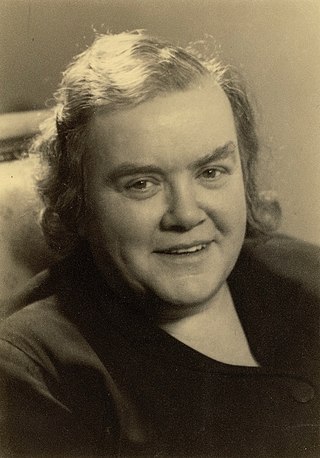
Adrienne von Speyr was a Swiss Catholic convert, physician, mystic, and author of some sixty books of spirituality and theology.
Kazoh Kitamori was a Japanese theologian, pastor, author, professor, and churchman. His most famous work in the West is The Theology of the Pain of God, which was published in 1946 in Japan and in the United States in 1965. He was a longtime professor at Tokyo Union Theological Seminary. He was, along with Kōsuke Koyama, a leading contributor to Protestant Christian theology from twentieth century Japan.
Theopoetics in its modern context is an interdisciplinary field of study that combines elements of poetic analysis, process theology, narrative theology, and postmodern philosophy. Originally developed by Stanley Hopper and David Leroy Miller in the 1960s and furthered significantly by Amos Wilder with his 1976 text, Theopoetic: Theology and the Religious Imagination.
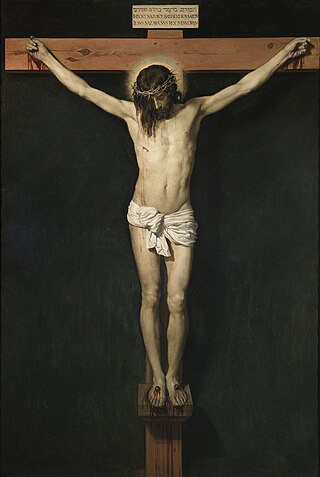
The crucifixion of Jesus was the death of Jesus by being nailed to a wooden cross. It occurred in 1st-century Judaea, most likely in AD 30 or AD 33. It is described in the four canonical gospels, referred to in the New Testament epistles, and later attested to by other ancient sources. Scholars nearly universally accept the historicity of Jesus' crucifixion, although there is no consensus on the details.
Mysterium Paschale. The Mystery of Easter is a 1969 book by the Swiss theologian and Catholic priest Hans Urs von Balthasar. The original German edition was published by Benziger Verlag, Einsiedeln. In 1983 it was reprinted by St. Benno-Verlag, Leipzig, including additions made to the second French edition Pâques le mystère, copyright 1981 by Les Edition du Cerf, Paris. The first English translation with an Introduction by Aidan Nichols, O.P., was published in 1990.
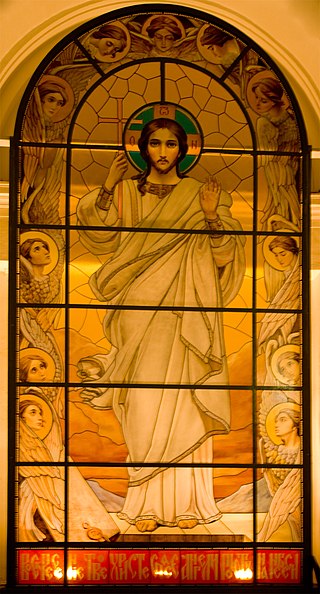
The knowledge of Christ refers to one of two possible, and at times related, topics in Christology: one addresses how Christians come to know Christ, the other focuses on the knowledge of Christ about the world. Discussions regarding the knowledge of Christ have had a central place in Christology for centuries. In the 20th century, the interplay between the two concepts was epitomized in the title of a book by Hans Urs von Balthasar: "Does Jesus Know Us? Do We Know Him?"
The Dialogue of Jason and Papiscus is a lost early Christian text in Greek describing the dialogue of a converted Jew, Jason, and an Alexandrian Jew, Papiscus. The text is first mentioned, critically, in the True Account of the anti-Christian writer Celsus, and therefore would have been contemporary with the surviving, and much more famous, dialogue between the convert from paganism Justin Martyr and Trypho the Jew.
The Yellow Crucifixion is a painting by Marc Chagall. It was painted in 1943 and is on display at Musée National d'Art Moderne in Paris, France.











